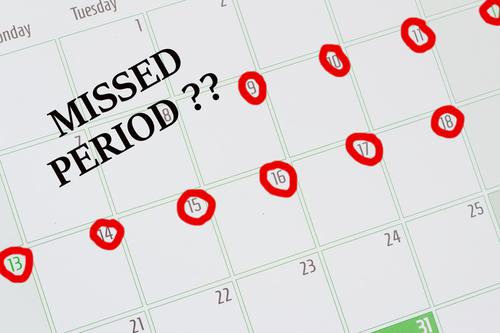Why Your Period Is Late and What You Can Do About It
It's fair to say that periods, in general, are unpleasant and most women do not look forward to it. However, late periods can also be worrisome for most women. But what exactly is considered a late period? A normal menstrual cycle can last anywhere from 21 to 35 days, and most periods come within that time span. The period would be considered late if it has not started within 5 days after its expected date.
Having regular menstrual cycles is a sign of good health. Therefore, a late period can leave a woman concerned. People often think that if a period is late, it is an indicator of pregnancy. While that idea is not wrong, a late period can also mean a lot of other things. In this article, we will explore the reasons why your period could be late and what you can do about it.

Reasons Why Your Period Is Late
Late periods could be a sign that something may be going on with your body. There are several factors that could cause this, and it is not always an indicator of pregnancy. If you are absolutely sure that you are not pregnant, one of the following factors might be a reason why your period is late.
1. Stress
Believe it or not, stress is the second most common reason why your period could be late, especially for teens and young adults. A missed period can be caused by either mental or physical stress.
Assess your daily activities and evaluate how much stress you are under. Some stress is normal for daily life, but too much stress is not good for your body. So, rather than worrying about how you can make your period come today, why not try to relax and focus more on how to get your stress levels down?
2. Hormonal imbalance
Hormones play a huge role in maintaining your menstrual cycle. If your body is experiencing a hormone imbalance, it may be the cause of your late period. Signs of hormone imbalance include acne, excess body hair, and weight gain.
A hormonal imbalance may be caused by medication. For example, taking birth control pills may mess up your hormone levels and cause your period to be irregular for a while. Furthermore, health conditions may also be the reason why your hormone levels are off. Such conditions can include:
- Polycystic ovary syndrome (PCOS)
- An over- or underactive thyroid
- Irregularities in your pituitary glands
- Issues with your adrenal glands
3. Weight fluctuations
Have you been gaining or losing weight lately? If so, that may be the reason why you missed your period. Weight fluctuations can influence your estrogen level. Having too little or too much estrogen can wreak havoc on your ovaries and menstrual cycle. If you are underweight or overweight and you have missed your period, it is time to visit the doctor.
4. Bad eating habits
A healthy diet is the key to having healthy menstrual cycles. Review what you have been eating lately, and you may see why you missed your periods. Cut down your sugar intake and eat more fibers, protein, and healthy fats. Don't forget to drink a lot of water to stay hydrated.
5. Excessive exercise
Have you been working out a lot lately? Overdoing it at the gym could be another reason for a missed or late period. A sudden drop in calories could cause a shock to your body and cause its hormone levels to fluctuate. Slow down a little and don't forget to nourish your body with nutritious food to replenish those calories that you have burned.
6. Sickness
Caught the flu or a really bad cold? Issues with your health may be the culprit for your late period. If your body is ill, it could be so focused on healing itself that it simply stops ovulating for a while. Consult a doctor if you think this may be the case.
6. Chronic medical conditions
Other than the occasional cold or flu, chronic medical conditions could also be a cause for your period to be late. But do not worry, these cases are rather rare. Diseases like diabetes, tuberculosis, lupus, and irritable bowel syndrome can sometimes throw your menstrual cycle off balance. If you think this may be the case, contact your doctor immediately. On the other hand, it could also be a structural problem with your ovaries or uterus. Contact your gynecologist to check for any tumors or cysts.
How to Get Regular Menstrual Cycles
Oftentimes, women do not pay enough attention to their own health. Eventually, it will take a toll on your body and affect your menstrual cycles.
While there is no definitive guide on how to bring on your period overnight, you can still make healthy lifestyle changes to have healthy menstrual cycles. Here are things you can do to ensure you regulate your period each month.
1. Lifestyle changes
Your daily habits have a great influence on your health. Assess your lifestyle and daily activities, then consider if your lifestyle is healthy enough. If not, here are a few lifestyle changes you can make to help you get your periods regularly.
2. Relax
 Remember, stress can throw off your menstrual cycle. So, try to relax more and let your body unwind. Reduce your workload and spend more time with your loved ones to reduce your stress level. You can also try to relax by meditating and spending more time on your hobbies.
Remember, stress can throw off your menstrual cycle. So, try to relax more and let your body unwind. Reduce your workload and spend more time with your loved ones to reduce your stress level. You can also try to relax by meditating and spending more time on your hobbies.
3. Consume foods rich in vitamin C
Aside from having a healthy and balanced diet, you will find that eating foods rich in vitamin C can help induce your period. This is due to the fact that vitamin C can increase estrogen production, a hormone that is vital to ovulation. Therefore, try to eat foods that are rich in vitamin C, such as:
- Citrus fruits
- Papayas
- Broccolis
- Carrots
- Spinach
- Pineapples
- Ginger
- Cumin
4. Take warm baths
 Warming up your body for multiple days in a row can help induce your period quickly. Focus on heating up your abdomen to directly target your uterus and ovaries. Take a warm bath daily for about 20 minutes or use a heating pad on your stomach.
Warming up your body for multiple days in a row can help induce your period quickly. Focus on heating up your abdomen to directly target your uterus and ovaries. Take a warm bath daily for about 20 minutes or use a heating pad on your stomach.
5. Do light exercises
While heavy exercise can cause you to miss a period, working out can get your blood flowing and induce your period. So, get up and do some light exercises. Yoga, swimming, and light cardiovascular exercises are perfect for inducing periods. Just remember not to overdo it.
6. Medical help
 As mentioned earlier, late periods can be a sign that something is wrong. If you are concerned, it is best to see a doctor or gynecologist and they can assess if there are any underlying health problems. If you have missed your period for two or three consecutive months, contact your doctor immediately.
As mentioned earlier, late periods can be a sign that something is wrong. If you are concerned, it is best to see a doctor or gynecologist and they can assess if there are any underlying health problems. If you have missed your period for two or three consecutive months, contact your doctor immediately.
If you are suffering from an illness such as diabetes, high blood pressure, or bowel issues, your doctor can help you find the best treatment for your condition.
Takeaway Message
Late periods are often a sign that there's something wrong with your body. You should never ignore these signs. So, if you are worried about your late period, calm down and figure out why it may be happening. Do not forget to plan a visit to the doctor and make healthy changes to your lifestyle. Good luck!
